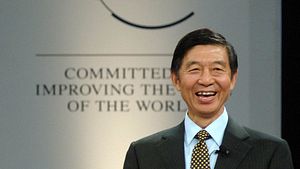The sudden and sad death of one of China’s most influential diplomats, retired Ambassador Wu Jianmin, was a huge shock to the country’s foreign policy community. Wu was killed in a car crash near Wuhan city, where he was scheduled to deliver a foreign policy speech. Known as perhaps the biggest ‘dove’ in China’s foreign policy community, Wu’s policy views were highly controversial in China, particularly in recent years. Many Chinese netizens viewed him as too soft with regard to the West and some even questioned his loyalty to the country.
Such a view is unfortunately wrong and disturbingly harmful to China’s national interests. As I wrote about two years ago, China was at a crossroads in terms of national security strategy. The famous debate between Wu Jianmin (dove) and Luo Yuan (hawk) in 2014 was actually a bit misleading at the time. Both Wu and Luo agreed that they were defenders of China’s national interests. The main difference between them, however, was about how to assess China’s external security environment and act in the country’s best interest. Nearly two years have passed and we can now see that Wu was probably more right than Luo (though Luo was right on many other points).
Over the last two years particularly, Wu became active in promoting his views of international politics and China’s foreign policy—perhaps he sensed an urgent need to roll back rising nationalist sentiments within Chinese society. Whether this is true or not, rising nationalism is both a threat to China’s own development and regional stability. Of course, we need to be careful here not to jump to quick conclusions that the level of nationalism is too dangerously high in China today. So far there is little evidence to support that claim, despite scattered evidence here and there.
Before his untimely death, Wu was also especially concerned about the possible wrong assessment of China’s international environment and strongly called for a continuous ‘low profile’ strategy. He also stressed the critical importance of a stable and good relationship with the United States. These are particularly good insights, and certainly should always be kept in mind for China’s top leaders.
This being said, calling Wu China’s biggest ‘dove’ is misleading too. In a way, Wu might have appeared to be soft with his gentlemanly style of speech, but he was definitely a staunch defender of China’s interests. For instance, Wu also believed that China’s military should be well prepared to fight and win a war, no matter who the adversary would be. He just did not believe that such a war was quickly approaching China, hence his support for a more relaxed external outlook and recommendation to focus on domestic problems.
Such a view might best be described as a rational view of national strategy. A ‘dove’ does not necessarily promote peace at all times and at any cost. A ‘hawk,’ likewise, does not always launch the missiles when there is a military crisis. Most members of China’s foreign policy community are neither ‘doves’ nor ‘hawks’ fully; they simply follow a rational calculation of strategy given the situation.
If this is true—and I believe it is—then there is no need for the outside world to be concerned about the loss of China’s most influential ‘dove.’ Wu was never a complete ‘dove’; he was simply a rational strategist, or a rational dove, if we must use the term. Only in that sense we can say that China needs more doves like Wu Jianmin. And many Chinese foreign policy experts would, in my view, accept this label. (Or we might as well call them rational hawks.)
At the end of the day, every country needs a healthy balance of rational doves and rational hawks. Overheated heads in charge of foreign policy represent the true danger. Wu had relentlessly warned us about this danger, and he was right. China and the world will benefit from his last warnings in dealing with regional security challenges in Asia and beyond.

































